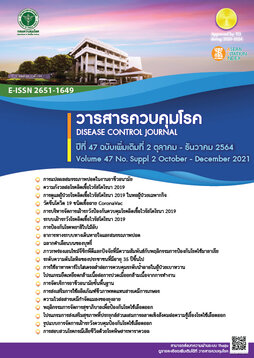Sanitation practice on dengue fever prevention and its related factors in urban community of Phitsanulok province
DOI:
https://doi.org/10.14456/dcj.2021.113Keywords:
sanitation practice, dengue fever, urban community, behaviorsAbstract
This face-to-face interview cross-sectional study aimed to identify factors related to sanitation practice on dengue fever prevention and its related factors in urban community of Phitsanulok province. Total of 198 household representative was randomly recruited into the study. The data was collected from August – November 2019. Multiple regression was performed at 5% significant level to identify factors related to the sanitation practice. The results showed that 66.2% of the participants was female and nearly half age between 50 to 59 years. 24.2% was at good level of knowledge and 55.6% was at good level of supportive to the sanitation practice. About 78.3% was at good level of the sanitation practice. Perceived on availability of resources and information received, only 20.7% and 18.2% were at good level. However, 30.8% had ever participated in community activities on control breeding places of mosquitoes. Factors significantly related to the sanitation practice were resources available and ever participated in community activities on control breeding places of mosquitoes (R2=0.176, p<0.001). Therefore, supporting of preventive resources and creating the onsite preventive activities and educational services are suggested in order to reduce the incident of dengue fever in the urban community area.
Downloads
References
World Health Organization. Dengue control [Internet]. [cited 2019 Jul 16]. Available from http://www.who.int/denguecontrol.
Division of Epidemiology, Department of Dis¬ease Control, Ministry of Public Health, Thai¬land. National Disease Surveillance (Report 506) [Internet]. [cited 2019 Jul 16]. Available from http://www.boe.moph.go.th/boedb/sur¬data/ index.php (in Thai)
Health Data Center, Department of Disease Control, Ministry of Public Health, Thailand [Internet]. [cited 2019 Jul 16]. Available from https://hdcservice.moph.go.th/ (in Thai)
Department of Health, Ministry of Public Health, Thailand. Manual for environmental health man¬agement in communities [Internet]. [cited 2019 Jul 16]. Available from: http://env.anamai. moph.go.th/download/bkWeb/book/a036.pdf (in Thai)
Senkram C and Nguanjairak R. Community participation development and role model on dengue hemorrhagic fever prevention and control in Thungkratadphattana, Nongki district, Burirum province A.D. 2017. The office of disease prevention and control 9th Nakhon Ratchasima journal. 2014;25(1):27-36. (in Thai)
Wongsubin K, Kaeodumkoeng K, Kengganpanich T, Kengganpanich M. Effect of empowerment program on prevention and control of dengue hemorrhagic fever among village health volunteers in Pongnamron sub-distric, Pongnamron distric, Chanthaburi province. The Journal of Prapokklao Hospital Clinical Medical Education Center 2016;33(3):196-209. (in Thai)
Lawrence W. Green, Marshall W. Kreuter. Health Program Planning: An Educational and Ecological Approac. 4th ed. McGraw-Hill: Higher Education; 2005.
Piromsethakun N, Prasertpunt V, Prapagdee B, Uyasatian U. Using the PRECEDE-PROCEED model for the development of solid waste man¬agement system for Thunyaburi home for the 1329
destitute, Pathumthani province. Proceedings of the 9th National Kasetsart University Kamphaeng Saen Conference (The 9th KU-KPS Conference), December 6-7, 2012, Nakhon Pathom, Thailand.
Ua-Kit N, Pensri L. Utilization of the PRECEDE MODEL in health promotion. Thai Red Cross Nursing Journal. 2019;12(1):38-48. (in Thai)
Apikomolkorn Y, Pintasai K. Effectiveness of the PRECEDE PROCEED model on health literacy among diabetes and hypertension patients at Ban Kluai Phae Sub-district Health Promoting Hospital, Lampang. Disease Control Journal. 2019; 45(4):343-54. (in Thai)
Krejcie R, Morgan D. Determining Sample Size for Research Activities. Educational and Psycho¬logical Measurement. 1970;30(3):607-10.
Cronbach L. Essentials of Psychological Test. 5th ed. New York: Harper Collins; 1990.
Pruttikarnkit T. Community Context Under the Semi-Urban, Semi-Rural Society. FEU Academic Review Journal. 2015;1(9):7-15. (in Thai)
Leimbach M. Learning transfer model: A research-driven approach to enhancing learning effectiveness. Information and Communication Technologies (ICT) Journal. 2010;42(2): 81-6.
Ponrachom C, Sriboonthip N, Wangkahart A. Casual Factors of Dengue Hemorrhagic Fever Protecting Behaviors of People Living at the Frontier of Thailand and Republic of the Union of Myanmar: Qualitative Research. Phetchabun Rajabhat Journal. 2018;20(1):46-55. (in Thai)
Rattanapunya S. Factors Influencing with Surveillance and Control Behaviors for Dengue Hemorrhagic Fever among Village Health Volunteers in Mae Rim District, Chiang Mai Province. Ratchaphruek Journal. 2018;16(2) :87-96. (in Thai)
Downloads
Published
How to Cite
Issue
Section
License
Articles published in the Disease Control Journal are considered as academic work, research or analysis of the personal opinion of the authors, not the opinion of the Thailand Department of Disease Control or editorial team. The authors must be responsible for their articles.






